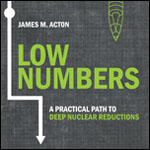Low Numbers: A Practical Path to Deep Nuclear Reductions James Acton | Carnegie Report
U.S. policy seeks to create the conditions that would allow for deep reductions in nuclear arsenals. Carnegie's James Acton offers a practical approach to reducing the U.S. and Russian stockpiles to 500 nuclear warheads each and those of other nuclear-armed states to no more than about half that number. This target would require Washington and Moscow to reduce their arsenals by a factor of ten. |
|
|
|
Daryl Kimball | Arms Control Now
In a stirring speech delivered two years ago in Prague's Hradcany Square, President Barack Obama outlined his vision for strengthening the global effort to curb the spread of nuclear weapons, moving forward on long-overdue disarmament measures, and preventing nuclear terrorism. He reiterated "clearly and with conviction America's commitment to seek the peace and security of a world without nuclear weapons."
Full Article Mark Hibbs | Arms Control Wonk
On Monday morning March 28, I appeared at the opening panel discussion at the 2011 Carnegie Nuclear Policy Conference, to discuss "Implications of Japan’s Nuclear Disaster," together with two colleagues, Eli Levite, ex of Israel's Atomic Energy Commission, and former NRC Chairman Dick Meserve; Vallumpadugai Arunachalam of the Center for Study of Science, Technology, and Policy in India; Irv Rotter, a partner at the law firm Sidley Austin in New York; and NRC Commissioner George Apostolakis. Full Article
Peter Crail | Arms Control Today
Iran intends to begin its first full-scale testing of its second-generation centrifuge models, according to a Feb. 25 International Atomic Energy Agency (IAEA) report, a move that could allow Tehran to increase the rate at which it enriches uranium. Full Article
Penny MacRae | Agence France-Presse
Japan's nuclear crisis has fuelled public unease in India over ambitious government plans to ramp up nuclear power capacity to feed the country's growing, energy-hungry economy. Full Article
Global Security Newswire
Editor's note: It should be noted that, according to the UK government, British warheads are manufactured and maintained in the United Kingdom. However, the extent to which they are based on US technology is unclear.
The United Kingdom's nuclear-armed ballistic missile submarines are to receive an enhanced version of a U.S.-manufactured nuclear warhead, the Federation of American Scientists said on Friday. Full Article |

